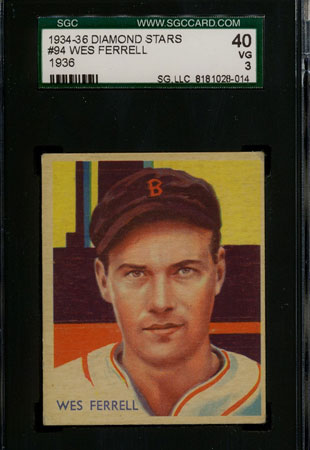 On occasion, Big League Stew honors a birthday boy per week by taking a longer look at his career. Please join us in lighting the candles.
On occasion, Big League Stew honors a birthday boy per week by taking a longer look at his career. Please join us in lighting the candles.
Every so often, a sweet-swinging hurler will come along — Dontrelle Willis or Carlos Zambrano or Mike Hampton or Micah Owings — and someone will break out a comparison to Babe Ruth, drawing comparisons to the most famous hitting pitcher of all time. But Ruth was only a full-time pitcher for five years or so. The best-hitting pitcher who actually remained a pitcher was today's birthday boy, Wes Ferrell.
(Ferrell's career OPS of .797 is the highest for any pitcher with at least 300 at-bats. Micah Owings currently has an OPS of .820, but only 203 at-bats in his career, and since his conversion to the bullpen, his batting chances have seriously decreased. For now, it's looking like Wes Ferrell will remain the greatest hitting pitcher of all time for a while longer.)
Wes never made it to the Hall of Fame, but his brother did. Rick Ferrell was a hard-nosed catcher who played 18 seasons from 1929 to 1947 (he didn't appear in 1946). However, Wes was the best hitter in the family. In 6,028 at-bats, Rick Ferrell hit .281/.378/.363/ with 28 homers and 734 RBIs. In 1,176 at-bats, Wes Ferrell hit .280/.351/.446, with 38 homers and 208 RBIs.
He was also a darned good pitcher, pitching from 1927 to 1941 and putting together a 193-128 record with a 4.04 ERA that was actually significantly better than the league average — his career ERA+ was 117, the same as Mark Buehrle last year — especially considering that he did most of his pitching in the 1930's, the greatest offensive explosion in baseball history until the Steroid Era.
Best Year: 1935 Boston Red Sox: 25-14, 3.52 ERA, 322 1/3 IP, 4.05 FIP, 1.38 WHIP, 1.02 K/BB .347/.427/.533, 7 HRs, 32 RBIs, 21/16 BB/K, 9.1 rWAR (pitching plus hitting)
Seriously: Wes Ferrell hit .347 while leading the league in wins and innings pitched. He finished second in the MVP voting that year, and didn't even make the All-Star team; he only made two All-Star teams in his career. (Rick Ferrell made seven All-Star teams.) The MVP went to Hank Greenberg, who finished with 8.3 rWAR; Hammerin' Hank had a terrific season, but Ferrell was arguably better on both sides of the ball.
Still, Ferrell never got any hardware. The rookie of the year award was not inaugurated until Jackie Robinson won the first one in 1947, and the Cy Young Award only began in 1956 with Jackie's teammate Don Newcombe, so Ferrell's second-place MVP finish in 1935 was the highest he ever finished in any awards voting. That probably tells you why he never made the Hall like his brother: he was a pretty good pitcher and an incredibly good hitter, and if he could have just been really good at one of those he probably would have made it. He was just too versatile.
But oh, what a year he had in 1935. He was easily one of the best hitters on the 1935 Red Sox, who had faced the dilemma of finding a position for Babe Ruth less than two decades before, and despite only gathering 150 at-bats, Ferrell nearly outhomered the entire Boston outfield: Mel Almada, Roy Johnson, and Dusty Cooke only poked a combined nine home runs to Ferrell's seven.
Worst Year: 1938: 15-10, 6.28 ERA, 179 IP, 1.85 WHIP, 5.21 FIP, 0.50 K/BB
.213/.377/.311, 1 HR, 7 RBIs, 16/11 BB/K, -1.7 rWAR (pitching plus hitting)
The other problem with Ferrell's Hall of Fame case is that his career was sadly abbreviated by arm pain. As SABR historian Mark Smith writes, Ferrell first felt shoulder pain while warming up for a game in 1931, when he was just 23. He pitched through it, because that's what pitchers did in those days, and he led the league in innings for three years in a row from 1935-1937. That essentially ended his career.
In fact, 1937 was the beginning of the end. He started out the year in Boston with a 7.61 ERA in his first 12 games, so they traded him to Washington for Ben Chapman and Bobo Newsom. He pitched decently for the Senators in 1937, but terribly in 1938. They finally released him in August, when he was picked up by the Yankees, for whom he allowed 33 runs (27 earned) in 30 1/3 innings. He had elbow surgery after the 1938 season, when he was just 30, but his career was nearly over. He pitched 37 1/3 innings from 1939 to 1941, with a 5.06 ERA, and hung up his spikes after that.
Claim to Fame: After his retirement from the majors, Ferrell stayed in baseball, and continued to crush the ball, as Mark Smith writes:
Between 1941 and 1949 Ferrell served as manager (sometimes player-manager) for a number of minor-league teams based in the southeastern states. He had not lost his hitting touch. In 1942, as player-manager for Lynchburg in the Virginia League he batted .361 with 31 homers and 99 RBIs in 123 games. As late as 1948, with Marion in the Western Carolina League, he hit .425 with 24 homers, 30 doubles, 14 triples, and 119 RBIs in 104 games.
Wes Ferrell was the greatest hitting pitcher of all time, and you could probably win a bar bet on that. Bottoms up, Wes.
No comments:
Post a Comment